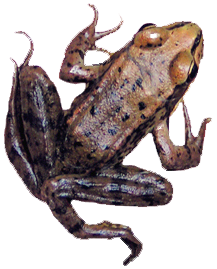On a recent Zoom meeting to discuss long-term solutions to maintain the Harborton frog population -- ponds and a tunnel! -- a comment was made that it was doubtful the frogs, by themselves, were worth the cost of a tunnel. The implication being that the frogs couldn’t survive a cost/benefit analysis, the “hardheaded,” realistic, economic point of view of serious people. I’d like to suggest this sort of thinking is so anthropocentric, and simplistic as to be meaningless.
How much is a frog worth? Well, that’s a tough question. Economists have managed to figure out the value of a human life, the figure changing with time, the country that asks, the person asking and why, and so on. More important for our discussion, humans give value to humans because we have a stake in the answer. No one has asked the frogs what their value is. In fact, they are so valued that we will kill millions of them without a second thought if they happen to be on our highways. If they put dents in our cars as we drove over them, their value would likely decrease, since they damaged our car, so the poor frogs value would go negative, that is, killing them would be a benefit to us. So far cost/benefit doesn’t look good for the frogs.
Let’s try another angle: what is the value of a frog to its ecosystem? Well, to do an adequate job of cost/benefit we’d have to know the bacterial make-up of soil and duff, the web of mycelium interactions with roots and soil, the microscopic insects that feed and interact with it all, the tiny animals that feed upon them on up to the frog and how they interact with all this through their life cycle, and what feeds on the frogs and so on. We are learning, but unfortunately we know very little about the astonishing interconnectedness and complexity of the forest floor, much less how to put a dollar value on any of it. (Wisdom might take a clue from this exercise and conclude that humility in the face of Creation might be a worthy stance for us to assume, but I get ahead of myself.)
The larger problem with nailing down the worth of a frog is that it’s a lose/lose proposition. In any such analysis the frog is going to lose because it has no standing, no status, no stake in Western philosophical, legal or economic thought. The frog is out there on a limb because Man has decided He is separate from and dominant to Creation. So the cost/benefit will never be fair to the frog, never even give frog a chance; Man will always win, which is to say the frog is expendable in the face of Man’s grandeur. The reason this is a lose/lose rather than a lose/win, with Man coming out on top, is because Creation isn’t impressed with Man confusing himself with God (whoever that is), sitting up there with God on his cloud. Earth isn’t impressed, nor is frog, but frog understands death comes to all things, while we look forward to the glorious day when we won’t have to die, or we’ll go to Mars, or other God-like stuff that makes us look an awful lot like Death’s special helper.
To the right of the frog is heating oil that’s seeping through the pavement. The oil has found its way into the hill’s water table, and subsequently down to the frog’s breeding wetland.

